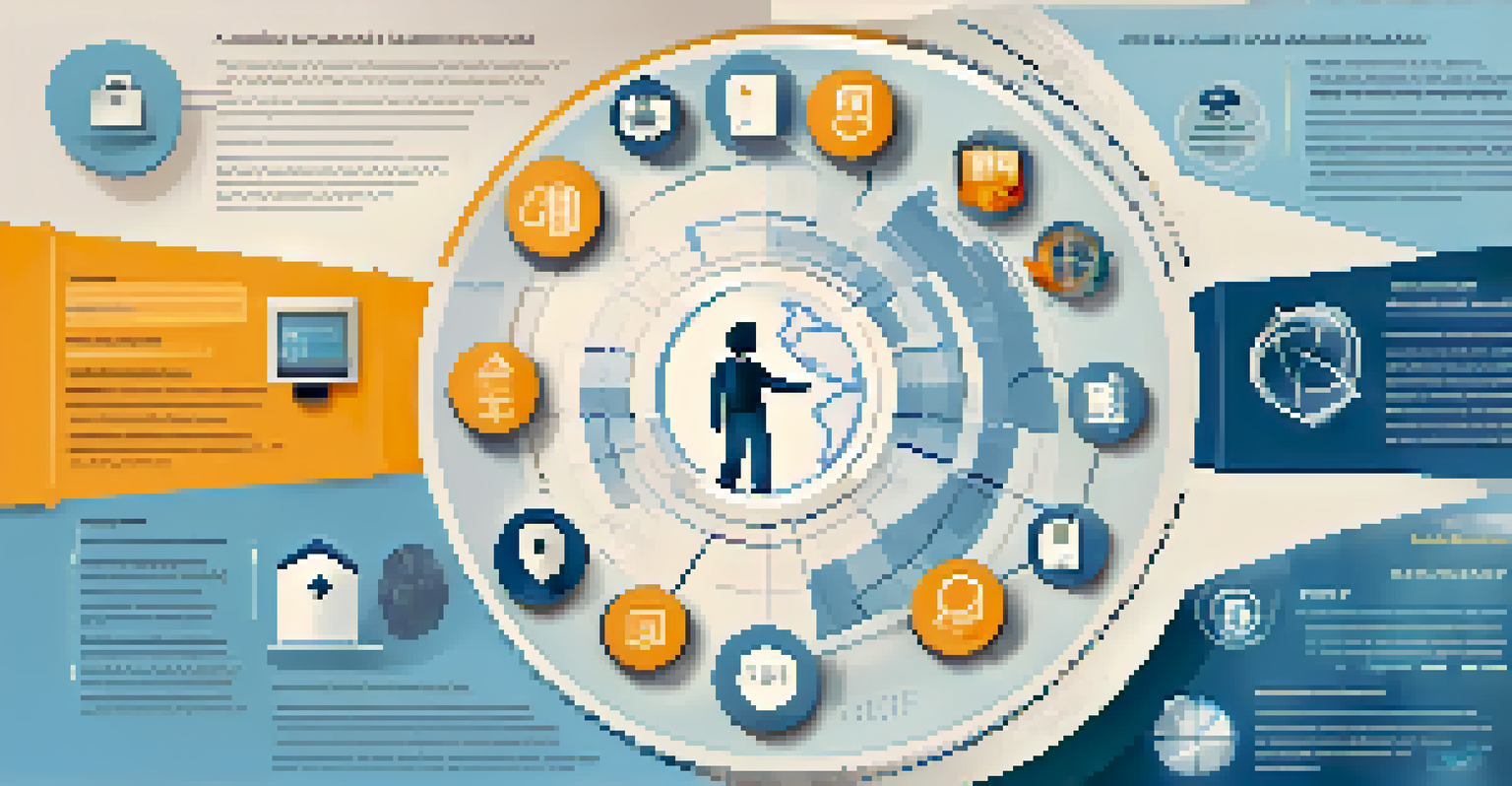The Benefits of Blockchain for Digital Identity Verification

Understanding Blockchain Technology Basics
Blockchain is a decentralized digital ledger that records transactions across many computers. This technology ensures that the information is secure and cannot be altered retroactively without the consensus of the network. Think of it as a shared notebook where everyone can see the entries, but once something is written, it cannot be erased.
Blockchain is the tech. Bitcoin is merely the first mainstream manifestation of its potential.
At its core, blockchain operates through a network of nodes that validate transactions. Each transaction is grouped into blocks and linked together in chronological order, forming a chain. This structure provides transparency and accountability, making it ideal for applications like digital identity verification.
By leveraging blockchain, we can create a more reliable and efficient way to manage identities. Instead of relying on a central authority, individuals can control their own data, leading to enhanced privacy and security.
Enhanced Security Through Decentralization
One of the primary benefits of blockchain for digital identity verification is its decentralized nature. Traditional identity systems often rely on a central database, which can be a prime target for hackers. In contrast, blockchain distributes data across a network, making it significantly harder to compromise.

Each participant in the network holds a copy of the blockchain, ensuring that even if one node is attacked, the data remains safe. This redundancy acts as a safety net, protecting against unauthorized access and data manipulation. Imagine trying to steal a book from a library; if every person in the community has a copy, your job becomes much harder.
Blockchain Enhances Data Security
The decentralized nature of blockchain makes it significantly harder for hackers to compromise identity data, providing a more secure alternative to traditional systems.
Furthermore, blockchain uses cryptographic techniques to secure data. This means that even if someone gains access to the network, they would still need to crack complex codes to alter or read sensitive information.
Improved User Control and Ownership of Data
With blockchain, individuals can have greater control over their personal information. Instead of relying on third-party organizations to manage their data, users can store their identity attributes on the blockchain. This shift empowers individuals to decide what data to share and with whom.
The future of identity is not a centralized database, but a decentralized network where individuals have control over their own data.
For instance, when applying for services like banking or healthcare, a user can provide verifiable credentials without exposing unnecessary personal information. It’s like having a digital key that opens only the doors you want, rather than handing out a master key to your entire life.
This level of control not only enhances privacy but also builds trust between users and service providers. As people become more aware of their digital footprints, the demand for systems that prioritize user ownership will continue to grow.
Streamlined Verification Processes
Blockchain simplifies the identity verification process, making it faster and more efficient. Traditional methods often involve lengthy procedures, including multiple document checks and manual approvals. With blockchain, once an identity is verified, it can be easily accessed and confirmed by authorized parties.
For example, a person can prove their age or citizenship status using a blockchain-based ID without needing to present physical documents. This not only saves time but also reduces the likelihood of errors that can occur during manual verification.
Users Control Their Own Data
Blockchain empowers individuals by allowing them to store and manage their identity attributes, giving them the authority to decide what information to share.
Moreover, automation through smart contracts—self-executing contracts with the terms directly written into code—can further expedite this process. These contracts can automatically verify identities based on preset criteria, making transactions seamless and hassle-free.
Cost-Effectiveness for Organizations
Implementing blockchain for identity verification can significantly reduce costs for organizations. By eliminating the need for extensive paperwork, manual checks, and third-party services, companies can streamline operations and cut expenses. This is especially beneficial for industries like finance, healthcare, and travel, where verification processes are critical.
Additionally, the improved security and efficiency can lead to fewer fraud-related losses. When organizations invest in robust identity verification systems, they not only protect themselves but also enhance customer trust and satisfaction.
In a world where every penny counts, adopting blockchain can be a strategic move for organizations looking to boost their bottom line while improving service delivery.
Interoperability and Global Acceptance
Blockchain's decentralized nature promotes interoperability, allowing different systems to work together seamlessly. This is particularly important in identity verification, as users often interact with various platforms across borders. With blockchain, a verified identity in one system can be recognized in another, making it easier for individuals to access services anywhere.
Imagine traveling to a different country and being able to use your digital identity to access banking, healthcare, or transportation without having to start from scratch. Blockchain can facilitate this global recognition of identities, creating a more connected world.
Streamlined Identity Verification
Blockchain simplifies and speeds up the identity verification process, reducing errors and reliance on physical documents through automation and smart contracts.
This potential for widespread adoption is already being explored by governments and organizations worldwide, paving the way for a future where digital identities are universally accepted and recognized.
Challenges and Considerations Ahead
While the benefits of blockchain for digital identity verification are significant, it’s important to acknowledge the challenges that lie ahead. Issues such as regulatory compliance, data privacy, and technological barriers must be addressed to ensure successful implementation. Governments and organizations will need to collaborate to establish standards and frameworks that support blockchain adoption.
Moreover, as with any technology, there is a learning curve. Users and organizations alike must become educated on how to utilize blockchain effectively for identity verification. This involves not only understanding the technology but also adapting existing processes to integrate with new systems.

Ultimately, overcoming these challenges will require a concerted effort from all stakeholders. As the digital landscape continues to evolve, addressing these issues will be crucial to realizing the full potential of blockchain in identity verification.